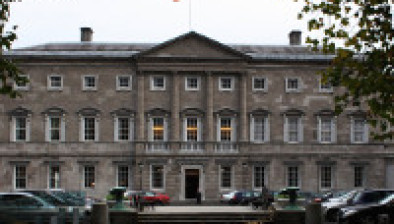Supreme Court: No right to enter State, and High Court judge criticised

Andrew McKeown BL
In an international protection appeal, the Supreme Court has held that there is no express right to enter the State for the purposes of making an application, save where the person is at its frontiers.

About this case:
- Citation:[2020] IESC 62
- Judgment:
- Court:Supreme Court
- Judge:Ms Justice Marie Baker
In her judgment, Ms Justice Marie Baker also criticised remarks made by Mr Justice Richard Humphreys about counsel at trial.
Background
The appeal considered whether the Minister for Justice and Equality is obliged to revoke a deportation order or otherwise facilitate a person to enter the State when that person has been granted consent to make a subsequent application for international protection under the International Protection Act 2015 s.22, the making of which requires his or her presence in the State.
Ivan Seredych, a Ukrainian citizen, arrived in Ireland in May 2001 with his then wife, who was not an EU national. Their son was born in June 2001. He had previously made an unsuccessful application for refugee status but the couple received permission to remain. That permission was renewed from time to time, and the most recent one expired in June 2016.
He separated from his wife and commenced a relationship with a naturalized Irish citizen. They married in September 2015, shortly after the birth of their first child and now have three children.
In November 2015, he was convicted of sexual assault under the Criminal Law (Rape) (Amendment) Act 1990 s.2, upheld on appeal to the Court of Appeal.
In May 2016, his solicitors applied to renew his permission to remain due to expire. The Minister refused renewal in September 2016 and a deportation order under the Immigration Act 1999 was made in February 2018.
A challenge to the deportation order was rejected by the High Court in March 2018, and Mr Seredych left the State in April 2018 in compliance with the deportation order, and lives in Ukraine. Before he left the State, his solicitors applied for him to be readmitted to the protection process under s.22. A recommendation under s.22(5) was made by the International Protection Officer that the Minister refuse to consent to the application. An appeal was lodged. In February 2019, the International Protection Appeals Tribunal (IPAT) set aside that recommendation.
In the High Court in December 2019, Mr Justice Richard Humphreys found against the Minister, quashing the Minister’s decision refusing to revoke the deportation order made against Mr Seredych. The Minister appealed to the Supreme Court.
Supreme Court
The Minister submitted that the proper interpretation of the 2015 Act must have regard to the fact that in national, international and EU law the right to make an application for international protection is confined to people in the requested state, or at its frontiers, and that, as Mr Seredych had left the State he can have no right to re-enter to process the application.
Mr Seredych submitted that he is to be permitted to enter the State to have determined the fresh application for protection. Citing principles established in East Donegal Co-Operative v Attorney General [1970] IR 317, it was argued that the Minister cannot lawfully obstruct the exercise of the right to make the subsequent application, the making of which had been sanctioned by the Minister himself.
PNS v The Minister for Justice & Equality [2020] IESC 11 was relied on as support for treating the application for leave to re-enter the protection process as a self-contained step. There it was held that while an applicant for leave is entitled to remain in the State pending the determination at first instance by IPO of his application under s.22, that applicant was not entitled to remain in the State pending an appeal to IPAT.
Ms Justice Baker said that Mr Justice Humphreys had wrongly regarded the process as a unitary and not sequential process. He had treated the Minister “as interrupting a process in a way that was inconsistent with the Minister’s own statutory role in that process.” Ms Justice Baker was unable to read s.22 in that way.
Ms Justice Baker adopted the analysis of the Court of Appeal for England and Wales in R (on the Application of AB the Secretary of State for the home Department [2018] AC Civ 383, Mr Justice George Leggatt noted that there is nothing in the Procedures Directive which obliges Member States to readmit to its territory an applicant who chooses to leave the member state while his or her application is pending.”
Noting the protections in Procedures Directive Art.32.1 on the making of a second or subsequent application by a person who has been refused protection or whose application was withdrawn, the judge said that if “a person cannot, by reason, for example, of not being present in the State, be regarded for the purpose of the Directive as a refugee or applicant for protection those guarantees do not operate.”
Ms Justice Baker said that there is no express right to enter the State for the purposes of making an application, save where the person is at its frontiers, and she noted that PNS made clear that the to remain is limited and does not extend to a right to remain pending an appeal to IPAT: “If a person does not have a right to remain pending the outcome of an appeal, still less could such a person have a right to return to the State to do so.”
Criticism of High Court judge
Ms Justice Baker criticised comments made by Mr Justice Humphreys at trial. He called into question the professional integrity and ability of counsel on both sides, and criticised each of them in different ways. Ms Justice Baker said that he made “a number of quite remarkable and personally insulting comments regarding the competence and trustworthiness of counsel for the State and the professional competence of both Senior Counsel”.
She said that these comments were “offensive and humiliating and were capable of being damaging to the career of counsel and personally upsetting”. Counsel were identified by their names, and “it goes without saying that neither had opportunity to respond”, she said.
“The tone may seem to be somewhat flippant or, were it not for the seriousness of the fact that they were contained in a written judgement of a senior member of the judiciary who has considerable experience in the area of immigration, might almost appear to be humorous or satirical. The trial judge may even have meant them in that way. But they must have caused upset and personal and professional embarrassment to the persons concerned.”
Such comments, Ms Justice Baker said, “have no place in a judgement”.
“What may trip lightly from the judge can fall heavily or very heavily on counsel in the light of the power imbalance.” The judge said that, while she disagreed with his reasoning, Mr Justice Humphrey’s judgment was “lucid, reasoned, elegant and intelligent. It would be a shame if the erudition displayed in his writing were to be lost in his more colourful observations which in my view are regrettable and have no place in a judgment of a court of law.”









